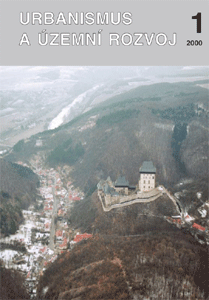
Recent Physical Planning Activities of Czech Municipalities, by Milada Kadlecová
The contribution contains an analysis of the recent development of physical planning in the Czech Republic, derived from the data of the national monitoring system of physical planning activities. The Institute for Spatial Development is entrusted by the Ministry of Regional Development with controlling the system. The monitoring system of physical planning activities is based on information gathered by Regional Development Sections of District Offices. The monitoring process uses now fully the possibilities of computer technology, publishing continuously the latest data and making them accessible on the Internet.
Physical Planning and the Requirements for Regional Development Plans and Structural Fund Programmes, as Seen from the Viewpoint of the Environment; A Discussion Contribution, by Josef Říha
The immediate impulse to write this contribution was the study called A German View of Current Physical Planning in Czechia, by Karina M. Pallagst, published in Urban Planning and Spatial Development 5/1999, pp. 2-8. In this important text I could not find a single remark about the consensus of governments on sustainable development, as put down in the document of Agenda 21 [8], mainly Chapter 10, named Integrated Approach to Planning and Management of Physical Resources. I fully identify myself with K. Maier's apprehension, saying: „...in regional politics, a narrowed approach may dominate, focused exclusively on economic development.“ [5] So as not to let this happen, we need not do more but enlarge the horizon of our current knowledge, respecting, suitably modifying, and applying the know-how of countries experienced in judging environmental influences. In this respect, the essential point is now the ability of physical planning to cooperate within the international framework of European Union regulations. One of the basic rules hereof is to consider the social-and-economic and physical-and-technical developments hand in hand with the viewpoint of possible impacts on the environment. For this purpose, common legislation of EU member countries has been built up, and is being enhanced further on. The contribution is followed by a commentary by Petr Lepeška of the Ministry of Regional Development´s Physical Planning Section.
Spatial Planning of Retail Businesses, by Zdeněk Szczyrba
The network of retail businesses plays a key role in the process of meeting basic needs of the population, and, as such, deserves close attention of local institutions, specialists, and the state administration. This fact is, however, often neglected. The development of this area seems to be rather chaotic, lacking in systematisation and compromise solutions favourable for all participating parties. Today’s situation is, paradoxically, being complicated by huge trading companies investing enormous amounts of money in the territories under question. The right way, though, would be to follow the legislation of advanced market economies, defining clearly the parameters of spatial planning of retail businesses.